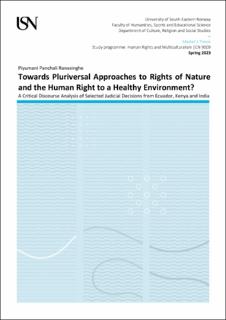| dc.description.abstract | Transitional Discourses, such as those on the “Rights of Nature”, have shed light on the anthropocentric framing of the Right to a Healthy Environment and the universalising effect of “human rights” which dominates patterns of historical, ideological, and other forms of marginalization of various groups and results in the neglect of Nature. This prompts the need for critical reflection on the power relations and ideology underlying legal discourses in the global South, particularly those interpreting the Rights of Nature and the Right to a Healthy Environment. As such, this thesis critically analyses structural power relations and ideologies fragmenting the human- nonhuman-Nature continuum through three selected judicial decisions from Ecuador, Kenya and India. To serve the study’s primary objective of uncovering power relations and ideology veiled within the judicial discourses, this thesis departs from a conventional legal interpretation of case law and adopts a transdisciplinary critical approach through Fairclough’s theory of Critical Discourse Analysis(CDA). Theories of Power, Ideology, Hegemony, Pluriversality and Transitional Discourses are used to pose meaningful questions about the interpretation of the Right to a Healthy Environment and Rights of Nature in judicial discourses in the selected cases. The findings derived through the CDA of the selected cases unveil the power relations and anthropocentric ideologies hidden in judicial discourses, particularly attempts to universalise the discourses on the Rights of Nature and the Right to a Healthy Environment. Such power relations and ideologies constrain the Pluriversal realisation of the said rights by controlling the relationality envisaged in Pluriversal ontologies. Premised on the findings, I argue that the appearance of the Rights of Nature in judicial discourses signals the transitions occurring within the environmental discursive frame. However, to transcend anthropocentric ideologies and power relations, the judicial approaches should seek to Pluriversally translate as opposed to homogenize the discourses on the Rights of Nature and the Right to a Healthy Environment.
Key Words: Right to a Healthy Environment, Rights of Nature, judicial discourses, Pluriversal, Transitional Discourses | |
